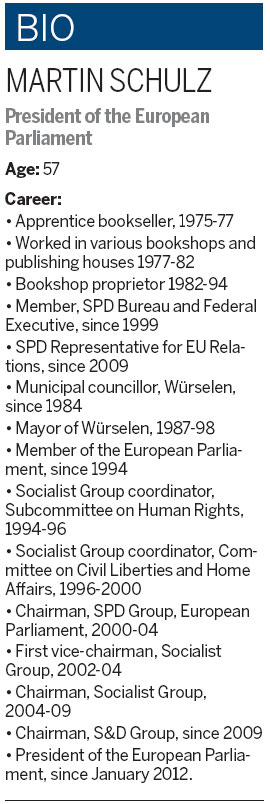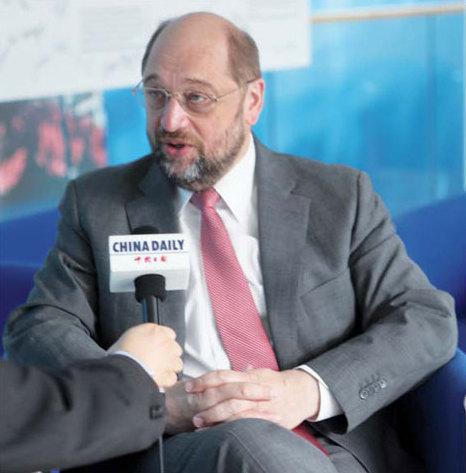Sharing the tasks of leadership
Updated: 2012-11-09 07:41
By Fu Jing (China Daily)
|
||||||||
|
European Parliament President Martin Schulz says he expects China to be a key player in the euro stabilization process. Wang Yuguo / China Daily |
EU wants China to press ahead with economic development, monetary governance, ecological conservation
Martin Schulz believes that the wheel has turned a full circle in the perceptions that Europe has on the Communist Party of China. Schulz, the current president of the European Parliament, says frequent exchanges between the CPC and the political parties in Europe have helped broaden understanding and removed most of the misconceptions.
The leader of the Social Democratic Party in Germany, however, admits that he was one of the early skeptics when the CPC mooted the idea of regular political dialogues between the two sides.
"Most of the interactions that take place now are conducted in an open-minded and pluralistic manner," says Schulz, who heads the European Parliament of 754 members from the 27 member states.
Since May 2010, the CPC and the eight political groups of the European Parliament, such as the European People's Party and the Progressive Alliance of Socialists and Democrats, have held four closed-door political dialogues on global challenges and Sino-EU cooperation in Beijing and Brussels.
"I have attended two of these debates and was very surprised at the political debate I participated in Beijing," says Schulz at his Socialist Democratic Party headquarters in Berlin, ahead of the 18th National Congress of the Communist Party of China being held in Beijing this week.

Though he has a busy schedule, Schulz still takes time off every Monday to hold discussions in Berlin with his party peers on important domestic and global issues. "It was during these meetings in Berlin that I realized the full value and the real advantages of the CPC proposal. The meetings with the CPC have helped provide valuable insight on the important role played by the CPC in China."
Schulz, a bookseller-turned politician, says that the CPC has not only played a pivotal role in China's major achievements during the last decade but also provided the strong and decisive leadership that was needed to take the nation forward.
The 18th Party congress is one of the most important political events, as it will not only showcase the new leadership, but also provide indications of the way forward. "China has an important role to play in global affairs. The role comes with high responsibility, and hence there will be keen interest on who the new leaders are and their plans for China."
Schulz says that during his frequent interactions he has had the opportunity to rub shoulders with several of the younger generation of politicians in China, some of whom are strong contenders for leadership positions. He says that what impressed him most about these politicians was their keen understanding and sharp knowledge of Europe, the European political system and European challenges. "Many leaders like Xi Jinping, China's vice-president, possess an excellent and thorough knowledge of the European political system."
Europe's interest in the new Chinese leadership broadly falls under several categories, he says. "We expect that the new leadership in China will focus on democratic progress, economic development, monetary governance and ecological conservation. We firmly believe that China and its leaders will take more serious steps to achieve these goals."
As far as global affairs are concerned, Schulz says China's role should extend beyond economic contribution. "We want China to recognize its role in global affairs and take more interest in global environmental issues, like climate change, which is a threat to everyone."
Schulz says China will also have to play a more active role in the global currency market, especially in stabilizing the US dollar and the euro.
"From a bilateral perspective also, I expect China to be a key player in the euro stabilization process. It is a dual-pronged strategy as we have to stabilize our currency, and China needs to diversify its forex resources." Schulz, however, says that this does not necessarily mean internationalization of the renminbi.
To achieve these goals, Schulz suggests that Europe should stabilize its currency, while China should focus on making its global investments more responsible and sustainable.
Schulz's suggestion comes after the European Union decided to establish a permanent financial firewall called European Stability Mechanism in October, with a maximum lending capacity of 500 billion euros, after more than two years of a sovereign debt crisis across Europe. Though the mechanism has no immediate plans to issue bonds, China is often perceived as a major buyer.
Even before the establishment of the ESM, China has made considerable investments toward the International Monetary Fund and the debt instruments floated by individual countries to solve the debt crisis in Europe.
Though Beijing has offered its unstinted help in solving the crisis in Europe, it is also important for Brussels to reciprocate by giving China the long-awaited market economy status and lifting the arms embargo. Experts from both sides feel that such gestures will go a long way in deepening economic cooperation between the two sides.
Brussels has often separated these two issues from economic cooperation with China. Though politicians like Schulz admit that economic interdependence will help boost cooperation, they are hesitant to hinge it on preconditions like market economy status and end of the arms embargo.
Schulz says that strong economic growth in China is good news for businesses in Europe, particularly for an export economy like Germany. A vibrant eurozone and resilient US markets are also of equal importance to China, he says.
He admits that China and the EU are two "decisive economies", which share enormous responsibilities in boosting trade, stabilizing currency, fighting climate change, and checking fraud and hunger in the world.
Schulz, however, remains non-committed on the twin issues of market economy status and an end to the arms embargo. "I think we should be honest with each other in these matters," he says.
The European Union would need a unanimous vote from its 27 member states to end the arms embargo on China, says Schulz. For the market economy status, which China will automatically get in 2016, the road ahead seems to be relatively easier, as economic cooperation between the two sides is "decisive" for the future. "From a technology and knowledge viewpoint, Europe is undoubtedly the leading force in the world," says Schulz. "Combining the market, knowledge and technologies will help boost cooperation between China and EU."
Liu Jia contributed to this story.
fujing@chinadaily.com.cn
(China Daily 11/09/2012 page24)

 Relief reaches isolated village
Relief reaches isolated village
 Rainfall poses new threats to quake-hit region
Rainfall poses new threats to quake-hit region
 Funerals begin for Boston bombing victims
Funerals begin for Boston bombing victims
 Quake takeaway from China's Air Force
Quake takeaway from China's Air Force
 Obama celebrates young inventors at science fair
Obama celebrates young inventors at science fair
 Earth Day marked around the world
Earth Day marked around the world
 Volunteer team helping students find sense of normalcy
Volunteer team helping students find sense of normalcy
 Ethnic groups quick to join rescue efforts
Ethnic groups quick to join rescue efforts
Most Viewed
Editor's Picks

|

|

|

|

|

|
Today's Top News
Chinese fleet drives out Japan's boats from Diaoyu
Health new priority for quake zone
Inspired by Guan, more Chinese pick up golf
Russia criticizes US reports on human rights
China, ROK criticize visits to shrine
Sino-US shared interests emphasized
China 'aims to share its dream with world'
Chinese president appoints 5 new ambassadors
US Weekly

|

|








